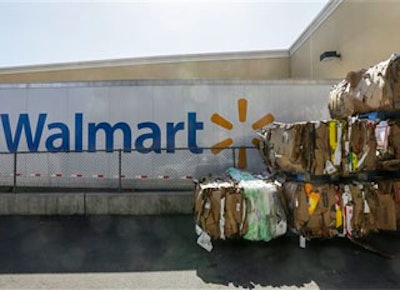
SAN FRANCISCO (AP) — Ending an environmental investigation that lasted nearly a decade, Wal-Mart Stores Inc. has pleaded guilty to improperly disposing of pesticides, fertilizer and other hazardous products and will pay a fine of $81.6 million.
 |
| Recycled cardboard boxes are ready for transport outside a Walmart store in Duarte, Calif. Tuesday, May 28, 2013. Wal-Mart Stores Inc. pleaded guilty on Tuesday to charges the company dumped hazardous waste in Calif. Wal-Mart entered the plea in federal court in San Francisco to misdemeanor counts of negligently dumping pollutants from Walmart stores into sanitation drains across California, a company spokeswoman said. (AP Photo/Damian Dovarganes) |
The company entered the guilty plea in federal court in San Francisco Tuesday to misdemeanor counts of violating the Clean Water Act and a law regulating pesticides.
The charges came from Wal-Mart's disposal of hazardous products that had been pulled from store shelves in California and Missouri because of problems like damaged packaging.
In Kansas City, Mo., the company pleaded guilty to improperly handling pesticides.
The plea agreements brought a close to an investigation that lasted eight years, involved more than 20 prosecutors and 32 environmental groups and cost Wal-Mart a total of $110 million.
Court documents show illegal dumping occurred in 16 California counties from Del Norte to Orange between 2003 and 2005. Federal prosecutors said the company didn't train its employees on how to handle and dispose hazardous materials at its stores.
The result, prosecutors say, was that waste was tossed into trash bins or poured into sewer systems. The waste also was improperly taken to one of several product return centers throughout the U.S. without proper safety documentation, authorities said.
In 2010, the company agreed to pay $27.6 million to settle similar allegations made by California authorities that led to the overhaul of its hazardous waste compliance program nationwide.
"By improperly handling hazardous waste, pesticides and other materials in violation of federal laws, Wal-Mart put the public and the environment at risk and gained an unfair economic advantage over other companies," said Ignacia S. Moreno, assistant attorney general for the Environment and Natural Resources Division of the Justice Department.
Wal-Mart spokeswoman Brooke Buchanan said the company has fixed the problem and is "obviously happy that this is the final resolution."
She said employees are better trained on how to clean up, transport and dispose of dangerous products such as fertilizer that are spilled in a store or have packages damaged.
Workers are armed with scanners that tell them whether a damaged package is considered to contain a hazardous material, she said.
Moreno said the fines against Wall-Mart "will, in part, fund important environmental projects in the communities impacted by the violations and help prevent future harm to the environment."
The state investigation began when a San Diego County health department employee saw a worker pouring bleach down a drain.
In another instance, officials said a Solano County boy was found playing in a mound of fertilizer near a Wal-Mart garden section. The yellow-tinted powder contained ammonium sulfate, a chemical compound that causes irritation to skin, eyes and the respiratory tract.






















